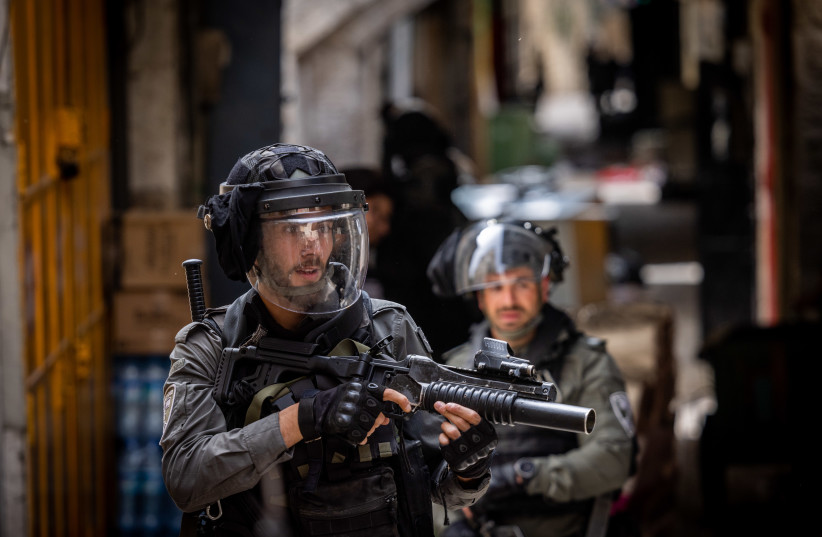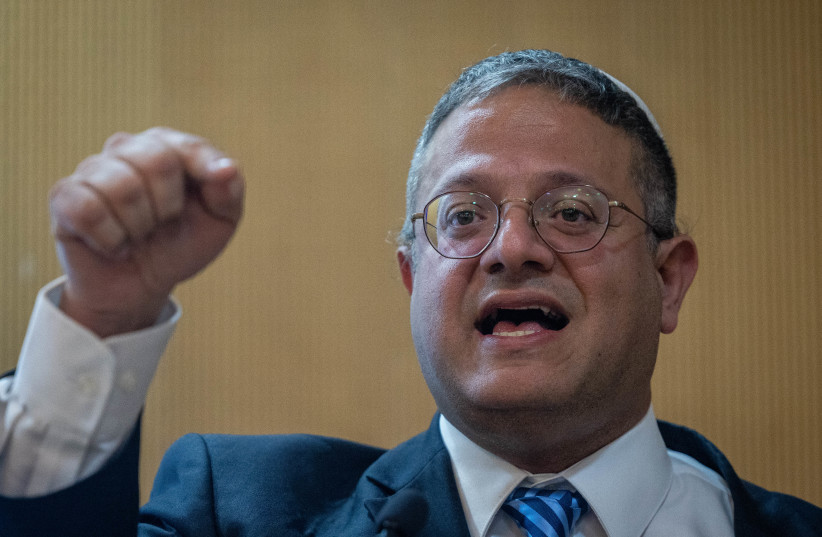As Muslims worldwide began on Thursday observing Ramadan, the month of fasting, prayer, reflection and community, Mohammed al-Halawani, who works at a souvenir shop in the Old City of Jerusalem, said he does not understand how the most sacred month for Muslims has become associated with violence and tensions.
“In the past few years, we have been hearing many Israelis warn about the possibility of an upsurge in violence during Ramadan,” said the 32-year-old Halawani. “I don’t understand why people think this is a month of violence.”
“In the past few years, we have been hearing many Israelis warn about the possibility of an upsurge in violence during Ramadan. I don’t understand why people think this is a month of violence.”
Mohammed al-Halawani
Halawani and other Old City merchants said that if Israel wants to avoid tensions and violence during Ramadan this year, it should refrain from “provocations,” including imposing restrictions on the movement of residents, especially at Damascus Gate, and allowing “Jewish extremists to storm al-Aqsa Mosque.”
They further warned that the public statements of some Israeli government ministers are already aggravating the situation.
The violence that takes place during Ramadan in Israel
They pointed out that this year’s Ramadan could be tenser than previous ones because of the deteriorating security situation in the West Bank and the policies and actions of the Israeli government, such as IDF incursions into Palestinian communities and attempts to “alter the historical and legal status quo at al-Aqsa Mosque [compound].”

But that does not necessarily mean that the next 30 days would be different from any other day in east Jerusalem and the West Bank, where clashes between the Israeli security forces and Palestinians occur on a daily basis.
For the past two years, the Jerusalem Police have placed barriers around Damascus Gate, where Muslims typically gather by the hundreds after the iftar, the meal eaten after sunset during Ramadan.
The move sparked a wave of protests and clashes between young men and police officers. The large presence of policemen inside and around the Old City further exacerbated tensions and resulted in more clashes, eventually prompting the police to ease the security measures.
“If the police decide to continue with the same policy, we will see more violence in the city during Ramadan,” said Ahmed Rajabi, whose family owns a grocery in the Old City’s Muslim Quarter. “There’s no reason for all these security measures other than to harass the people and prevent them from celebrating Ramadan. If the police don’t want violence, they should stop provoking and harassing the young people who want to sit on the stairs of Damascus Gate. When the police are not there, there are no tensions. The people want to enjoy Ramadan, not fight with the police.”
Rajabi and other residents said they are also worried about the possibility that the Israeli government would allow Jews to visit the al-Aqsa Mosque compound (Temple Mount) during the Passover holiday, which begins on April 5. Such a move, they warn, is likely to trigger widespread protests and clashes with the police.
Palestinian factions warn against Israeli "provocations" during Ramadan
Hamas, Islamic Jihad and other Palestinian factions have also warned against Israeli “violations” and “provocations” against al-Aqsa Mosque during Ramadan.
Saleh Arouri, deputy chairman of the Hamas political bureau, warned Israel against taking advantage of Ramadan to “divide al-Aqsa Mosque in time and space” between Muslims and Jews.
“The occupation should not expect its attempts to pass without a powerful response from our people and our resistance,” Arouri was quoted by Hamas-affiliated news websites as saying.
“The occupation should not expect its attempts to pass without a powerful response from our people and our resistance.”
Saleh Arouri
Another Hamas official, Mohammed Hamadah, who serves as the group’s spokesman for Jerusalem, warned against any Israeli attempt to limit the number of Muslim worshipers wishing to pray at al-Aqsa Mosque during Ramadan.
“Any [Israeli] restrictions would be considered a blatant violation of the Palestinians’ natural right to worship and pray at al-Aqsa Mosque,” Hamadah told the Hamas-affiliated Quds Press website. He called on Muslims to converge on the mosque during the entire month of Ramadan and “defend it against attacks by the occupation army and extremist settlers.”
On the eve of Ramadan, PIJ officials issued similar threats and warnings. Daoud Shehab, a senior PIJ official, warned that the “schemes of the fascist occupation government against the holy sites were tantamount to a declaration of war on Jerusalem and all the Palestinians.”
Such warnings should not be shrugged off, especially in light of the meeting that took place earlier this week between PIJ secretary-general Ziyad al-Nakhaleh and Hezbollah chief Hassan Nasrallah.
According to a PIJ statement, the meeting, which took place on the eve of Ramadan, dealt with the “situation in the region and the challenges facing the Palestinian resistance.” The two sides agreed “to continue consultations and coordination between them to strengthen the resistance to confront the Israeli occupation,” the statement read.
Also on the eve of Ramadan, the Lions’ Den armed group, which has claimed responsibility for a series of shooting attacks against Israeli soldiers and civilians in the Nablus area over the past few months, announced that “the hour of confrontation [with Israel] is approaching, the drums of war have begun to sound in every inch of our blessed land, and we are fully prepared to engage in larger battles with this brutal enemy.”

The threat came in response to a hunger strike declared by Palestinian security prisoners in protest of new restrictions imposed on them in Israeli prisons by National Security Minister Itamar Ben-Gvir. The prisoners had threatened to go on hunger strike on the first day of Ramadan, a move that is also likely to increase tensions during the holy month.
Several Palestinian factions, including Hamas and PIJ, have called for holding rallies in the West Bank and Gaza Strip in the coming days to voice solidarity with the prisoners. Similar rallies are also expected to take place in east Jerusalem and after Friday prayers at al-Aqsa Mosque.
Hamas, Palestinian Islamic Jihad don't want another war with Israel in Gaza
IN SPITE of their ongoing calls for “escalating the resistance” against Israel, Hamas and PIJ do not seem to be keen on initiating another war with Israel in the Gaza Strip, at least not under the current circumstances where all eyes are turned toward the West Bank and Jerusalem.
The two Iranian-backed groups are focusing their efforts on instigating violence in Jerusalem and the West Bank, while avoiding dragging the Strip into another round of fighting similar to the one that took place in 2021. Then, Hamas and PIJ launched a massive missile attack against Israel after an ultimatum to Israel to remove all its security forces from the al-Aqsa Mosque compound and the east Jerusalem neighborhood of Sheikh Jarrah. Although the attack was launched toward the end of Ramadan that year, the ensuing war between Israel and Hamas is often linked to the holy month.
“The war did not erupt because of Ramadan, but because of Israeli practices against al-Aqsa Mosque and the Palestinian families facing eviction in Sheikh Jarrah,” argued Adnan Samara, a political activist from east Jerusalem. “It’s wrong to assume that the war broke out because of Ramadan. It erupted because of Israel’s security measures and provocations, which began long before Ramadan.”
Hamas and PIJ are aware that the Palestinians in the Gaza Strip would not be happy to be dragged into another war with Israel. The economic situation in the Strip has slightly improved over the past year, mainly due to the unofficial ceasefire with Israel and money coming from Qatar and Iran.
WHILE HAMAS and PIJ are making every effort to step up the violence in the West Bank and Jerusalem, the Palestinian Authority, with the help of Egypt and Jordan, is searching for ways to de-escalate tensions with Israel, especially during Ramadan.
The two recent summits held in Jordan’s Aqaba and Egypt’s Sharm el-Sheikh resorts under the auspices of the US were mainly intended to de-escalate tensions and increase security coordination between the PA and Israel ahead of Ramadan.
The Egyptians have been exerting heavy pressure on Hamas and PIJ to avoid an all-out confrontation with Israel. The Jordanians, for their part, are worried that renewed tensions and violence at the al-Aqsa Mosque compound would undermine their status as custodians of the Islamic holy sites in Jerusalem.
The PA, on the other hand, is concerned that a new intifada would further undermine its control over major Palestinian cities and towns in the West Bank. Hamas and PIJ have already managed to establish several armed groups, particularly in the northern West Bank, posing a direct threat to the PA and its security forces.
A senior PA official in Ramallah said this week that there were “indications” that Hamas and PIJ were planning to step up their activities in the West Bank during Ramadan.
The official claimed that the two groups have been pouring tens of thousands of dollars into boosting their armed groups in Nablus and Jenin. Worse, he added, there are signs that some unruly gunmen who are affiliated with the ruling Fatah faction, headed by PA President Mahmoud Abbas, are working in coordination with these groups.
“They offer each young man $300-$400 a month to join the armed groups in the West Bank,” the official revealed. “Hamas and Islamic Jihad are also providing money for the purchase of weapons.”
In addition to the funding, the official pointed out, Hamas and PIJ have increased their calls to Palestinians to carry out terrorist attacks against Israel.
“The rhetoric and actions of some members of the right-wing Israeli government such as Itamar Ben-Gvir and [Finance Minister] Bezalel Smotrich are providing ammunition to Hamas and Islamic Jihad and facilitating their job of recruiting more people,” he complained.
Yet, the PA’s ongoing harsh anti-Israel rhetoric is also intensifying tensions and creating the impression that Israel and the Palestinians are headed toward a major confrontation. Despite the positive atmosphere that prevailed during the Aqaba and Sharm el-Sheikh summits, senior Palestinian officials and Palestinian media outlets have not changed their tone toward Israel. The terms “war crimes,” “apartheid,” “ethnic cleansing,” “extrajudicial killings” and “fascism” have become an integral part of the PA lexicon, which increasingly appears identical to the language employed by Hamas and PIJ leaders and spokesmen.
While tensions between Israel and the Palestinians will undoubtedly continue to soar during Ramadan, that does not necessarily mean that there will be more violence on the streets of Jerusalem or Nablus and Jenin.
Palestinian officials in Ramallah maintain that the actions of the Israeli government and security forces will determine whether Ramadan will pass quietly or witness more scenes of violence. And when these officials talk about actions, they are specifically referring to Israeli security measures in Jerusalem, especially the Temple Mount. Additionally, they are referring to the talk in Israel about demolishing illegal houses in east Jerusalem during Ramadan.
Any minor incident in Jerusalem could lead to an “explosion” in the West Bank or Gaza Strip, cautioned another Ramallah-based official.
“That’s why, if I were Israel, I would be careful not to play with fire during this holy month,” he said.
